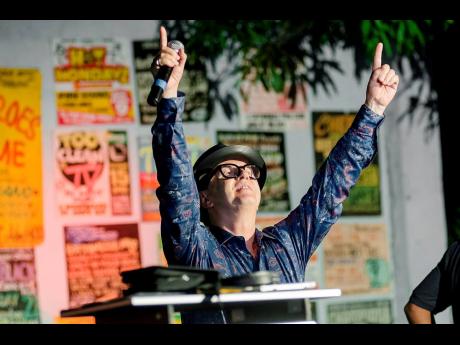Afrobeat has replaced dancehall – Rodigan
British radio disc jockey and celebrated sound clash champion, David Rodigan has sounded off on an uncomfortable conversation, with an unsettling conclusion. As veterans and newcomers struggle to find common ground between the classic, internationally in-demand sound of ’90s dancehall and the emerging new style that many people akin to trap, rap and hip hop, Afrobeat not only entered the fray, but is now dominating in this musical melee.
“Dancehall music has been replaced by Afrobeat. That’s a fact,” Rodigan said recently during a media launch for Dubwise Jamaica.
Beyond the African genre’s rapidly growing popularity, Rodigan has also observed that the infectious influence of reggae and dancehall music exists clearly in Afrobeat productions. “Nigerians are making music in the heartland of Africa, which replicates the essence of dancehall music made in Jamaica in the 1990s, and they are flavouring it with their own spice. What’s ironic is, with some of these Afrobeat, artistes are attempting to speak in an authentic Jamaican accent – which shows a direct connection to dancehall music, music that was born and bred in the land of Jamaica and has been exported back to the Motherland of Africa, where it’s always been incredibly popular. It’s important to remember that Jamaican music has played a major, significant role in international music,” he said.
Like UB40 and other wildly successful British bands that took on Jamaican music as their own, and to this day sustain as authentic reggae acts, Rodigan surmised that Africans are taking their turn.
To determine why Afrobeat blasts through the airwaves instead of dancehall, Rodigan takes his answer from the people. “‘It’s just so nice, it’s sweet. It’s easy to dance to. It hasn’t got any attitude.’ This is some of the feedback I’m getting on why they like Afrobeat,” he shared.
Rodigan would prefer that the question is, instead, why isn’t there more Jamaican music being played? “That is the question that should be asked, because one of the criticisms being levelled on what’s been happening in Jamaica with the youth culture movement - people in Europe are saying it’s not dancehall anymore. It’s a beat that’s not dancehall,” he said.
New Development
Some have called the new sound that is not quite dance, ‘trap-dancehall’. Rodigan calls it a ‘development’.
“There is a new subculture, with a particular bank of music that’s being made in Jamaica, which doesn’t connect to me, I’m afraid. I don’t think it’s the new wave; I think it’s a development. I have to point out, I’m merely an observer. Somebody once said, if you don’t get it, it’s not for you. Young people don’t make music for their moms and dads. They make music for themselves,” he said.
All the same, the respected reggae and dancehall aficiando is still keen on a number of Jamaican entertainers, and holds the faith that they will contribute to reggae and dancehall’s esteem.
In addition to the likes of Sevana, Lila Ike, Bella Blair and Koffee as bastions of the culture, Rodigan also mentioned the rise of so-called ‘reggae revivalists’ Protoje, Chronixx and Jesse Royal as figures who will carry on the indigenous music’s authenticity. He said: “These artistes, I believe they will continue to grow, they will continue to gather strong fan bases. They are continuing great Jamaica music.”

